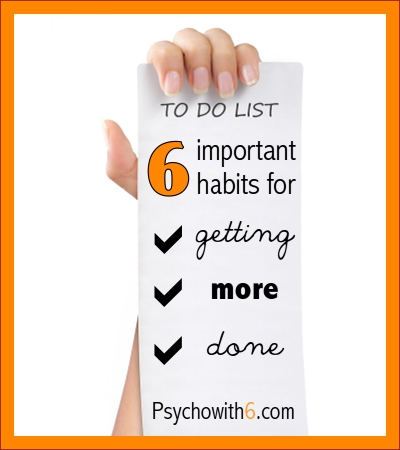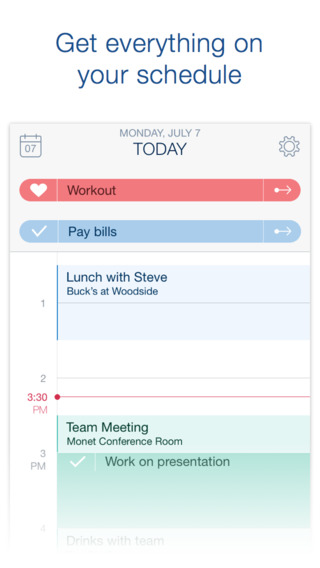 I spent a year doing weekly experiments in productivity. The benefit of the series is that I learned the most important habits for getting more done. My hope is that reviewing what works for me might give you some insights into what could work for you. I hope you’ll listen to an interview I did with Barb Raveling of the Christian Habits podcast on the subject. Barb wanted specific advice for a time-management hiccup that plagues many of us. I’d love to know if you have different advice.
I spent a year doing weekly experiments in productivity. The benefit of the series is that I learned the most important habits for getting more done. My hope is that reviewing what works for me might give you some insights into what could work for you. I hope you’ll listen to an interview I did with Barb Raveling of the Christian Habits podcast on the subject. Barb wanted specific advice for a time-management hiccup that plagues many of us. I’d love to know if you have different advice.
#1 Plan your week
David Allen’s Getting Things Done was my first foray into productivity literature. I loved it and should have been a paid seminar leader for as many people as I told about it. GTD was the impetus behind me finally getting my email under control and collecting all my to-do’s into one trusted system. I had these habits prior to experimenting. The GTD habit I didn’t have was a weekly review.
I became overwhelmed by the process of reviewing all potential to-do’s each week as part of the GTD process and so I just didn’t do it. Unfortunately, that meant that I wasn’t reviewing my calendar or projects for the upcoming week. I was often finding myself surprised that I couldn’t get to a number of tasks I planned because I had forgotten about prior commitments.
Using a paper planner during my experiments convinced me weekly planning was important. Now I have the habit of planning my week each Sunday. I actually look forward to it! I review my calendar, projects, and life areas in ToDoist, and even Pinterest ideas that are sorted into corresponding secret boards. Rather than overwhelming me, a weekly planning session (or review) helps me feel in control. I can set weekly goals and make sure that the tasks I can reasonably accomplish in the upcoming week are visible. The rest are put aside. I no longer have calendar surprises! For more on my weekly planning process, read this post.
If you aren’t getting much accomplished in a given week, try a weekly planning session. Just 30 minutes of planning will be a wonderful investment in your productivity.
#2 Schedule your day
Before my year of productivity, I wasn’t really wild about scheduling my days. It felt too restrictive for this spontaneous, time-rebel woman. I did love my week of using SmartDay, an iOS app that automatically places to-do’s around scheduled activities. But my passion for the habit of scheduling my days didn’t reach its peak until after the series was over.
The first thing that convinced me of the value of scheduling was Francis Wade’s post that has been hugely popular on this blog. I thought I needed to revisit the idea and I did begin using SmartDay more frequently. But it wasn’t until I read this article about how the president’s day is scheduled that I realized that I needed that kind of productivity. While I don’t have an assistant who schedules for me, I am that assistant.
About the time that I read this article, I heard about an iOS scheduling app very similar to SmartDay called Timeful. I love it! Each morning I put together the day’s agenda based on my weekly plan. When each new activity is supposed to start, Timeful plays a pleasant tone on my phone. Unlike a paper schedule, Timeful makes it easy to move things around and change the amount of time I plan to devote to them. Timeful reigns me in when I start off thinking I can easily finish 101 tasks in a day; they just won’t fit in the calendar! If I want to leave times open in my schedule, Timeful makes suggestions and learns from my behavior when I am most likely to want to do tasks. The bonus is Timeful can be used to schedule goals as well. I don’t think I’ve ever completed the schedule as written, but here’s why this doesn’t discourage me: I accomplish more in half a day that’s been scheduled than I do in an entire day just working from a to-do list. I created a Timeful calendar in GCal and now also have a record of how I’ve spent my time.
If you need to get more done, try scheduling your day. Even old-fashioned paper will work!
#3 Build energy-based routines
Routines differ from schedules in that they are tasks you repeat daily or weekly and don’t need to be put on your to-do list. I relied on routines before starting my year of productivity, but I kept trying to force myself into idealistic routines that just didn’t work for me. For example, I tried to get myself to do homeschooling subjects with the kids (that I don’t enjoy doing) in the afternoon. Once afternoon comes, I have very little energy left to overcome resistance. I learned that putting those subjects early in the day, when I’m most energized, made all the difference. I saved the subjects I loved to teach for the afternoon.
Similarly, I learned that trying to get myself to do high-energy tasks in the evening was a waste of time–no matter how ideal it would be. Evenings are now saved for social media, schlepping kids to activities (when I can’t talk my husband into doing it), and family fun. That understanding enabled me to stop being so mad at myself for “not getting anything done” in the evenings.
But I was left with a dilemma. I am writing a homeschool curriculum–a major undertaking. I kept trying to find a time to work on it in my daily schedule. Morning was an obvious choice, but it wasn’t working for me at all. I can find morning time to exercise, do devotions, and chat with my husband, but not for writing. I tried getting up even earlier during the course of my year of productivity and found I was crashing mid-morning. I’ve already made it clear that I’m worthless most evenings, but I thought I would just have to force myself to write at night. You can imagine how that went. I realized that the ideal time for me to write was early afternoon. Yes, I just said that I didn’t like to teach aversive subjects in the afternoon, but that’s teaching after a full morning. I have always longed to write in the afternoon, but felt guilty about it. After reviewing other homeschooling mothers’ schedules (who have many children and blog, too), I realized I was not only spending more time doing hands-on teaching than they were, but than most public school teachers! I reevaluated my teaching schedule, made some changes to encourage more independent learning, and started writing in the afternoons. I have written every single day since making the change and feel energized while doing so!
If you are struggling to get things done, build a routine around your energy levels. Keep experimenting until you find the right combination of times and tasks.
#4 Work little and often
It’s a waste of time to try and figure out why you procrastinate on some tasks. Yes, I’m a psychologist and I’m saying that! I have no idea why I hate mailing things so much, but I do. I would rather take a paper and drive it across town. It’s weird. But during my year of living productively, I discovered a solution: just do a little and do it often.
I discovered that I could get things mailed if I counted any tiny step as done for the day. I would find an envelope and re-date the mailing task for the next day when I would put a stamp on it. Yep, it’s ridiculous, but it worked. Before I started practicing little and often, I would have items to be mailed sitting for weeks. Now when I come across a scheduled task that I’m putting off, I will count any little step as done for the day. Fortunately, I don’t have to do this often, but it makes a world of difference to do something. The next day when I’m faced with the same task, it feels less onerous because “I’ve already started it.” Even though Pomodoros were a separate weekly experiment during the year of productivity, they’re effective for the same reason. For a particularly aversive task, I will set the timer for five minutes and call it done.
Do you keep facing the same yucky task day after day? Do five minutes or one tiny step on it and count it done! Repeat tomorrow.
#5 Do it now
My week of doing it now appealed to readers and even my kids who loved this video. I can be doing a great job with my schedule, but if I don’t do the little tasks when they need to be done, I can easily find myself overwhelmed. I’m talking about things like adding things to shopping lists as you see you need them, putting clothes away as you take them off, and cleaning up messes as you make them. David Allen recommends doing tasks that took less then two minutes. I think that’s a fine rule, but even better is to do tasks now if now is the best time to do them. We will not have more time later!
Some quick tasks are better batched. Paying bills is a good example. I pay bills online on Mondays. Even though it would take me just a minute to pay a bill I receive on a Tuesday, I don’t. But if I spill a box of cereal, I’ll clean it up now. I won’t wait until kitchen clean up day. Does this seem obvious? I become an imbecile when it comes to these things.
If tasks are starting to pile up, do them now if now is the best time to do them.
#6 Ask for help
I have my kids do chores and my husband is a big help, but I rarely ask for help in other ways. During my weekly experiment, I learned how important delegating can be to get more done. But in the months since my experimenting, I have learned that asking for help can be an even more powerful way of accomplishing things.
Because I didn’t have the ask-for-help habit, I wasted a lot of time doing things myself or doing them the hard way. I recently found another example of how my behavior hurt my productivity. I had been wishing for an iOS app that would enable me to process my to-do’s. I had to wait to use the desktop to get them into ToDoist. I also wished that there were an iPhone app that would allow me to attach photos or files to email automatically. Mike Vardy mentioned Dispatch in the ToDoist Google+ group. Turns out, it does everything I need it to do. I could have been enjoying the faster email processing if I had only asked if there were apps that did what I needed. It’s a hard habit to break, but I’m trying to ask people for help more often.
I’ve also learned to ask for help from God. I have always been willing to ask God for help for medical and relationship and even emotional issues. But not to-do’s. When it came to tasks, deep down I felt that I had no business asking God for help. I just needed to work harder, stop procrastinating, and stop watching cat videos. If I asked for help, that’s what He would say anyway, isn’t it? It turns out that God is much less of a task master than I am. Even when I waste time, God wants to help me. He doesn’t want me to be a self-reliant Christian, but to get to know how good He really is. He has canceled appointments when I’m overbooked, left the stoplights on green, and even given me a close parking space when I asked. Asking God for help with all the little to-do’s is a habit I’m in the process of developing. God is in the process of using it to develop me.
If you don’t know what to do first, try going to God! Ask Him for help, even if you’ve been on a cat video marathon.
Which of these habits do you need to develop most? Or is there another habit that helps you get more done?
I’d love to connect on Google+, Facebook, Pinterest, or via productivity posts in your inbox.








These are some awesome tips Melanie Thanks so much!
Thanks so much, Alyssa. Glad they were helpful.